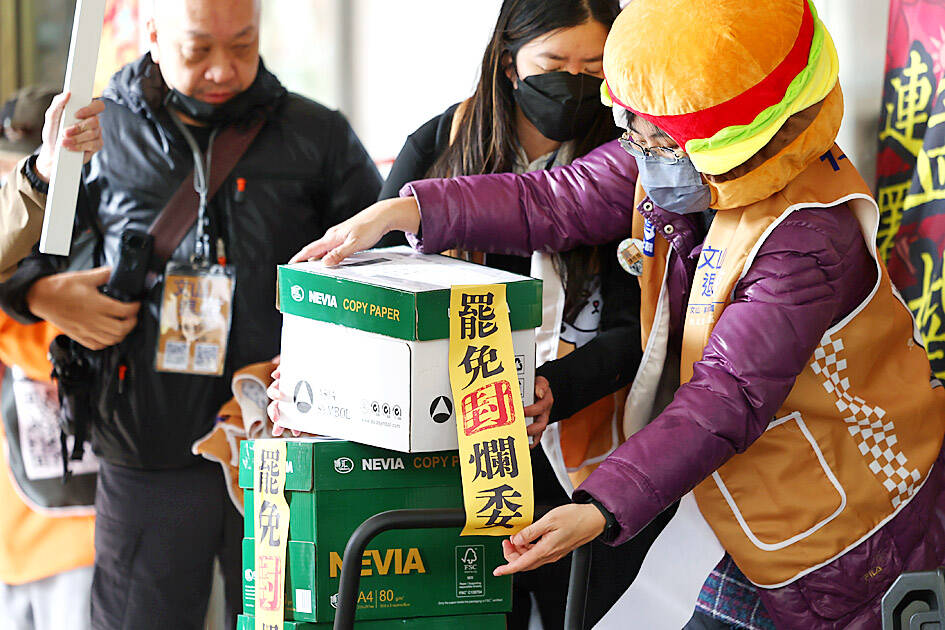Nineteen legislator recall campaigns passed an initial review and are to enter the second-stage petition, while the nine cases that did not reach the threshold would have another opportunity for supplementary submissions, the Central Election Commission (CEC) announced yesterday.
The CEC said it had received 64 recall proposals — 54 for lawmakers, one for a city mayor and nine for city or county councilors.
The 19 cases that passed the threshold were all against Chinese Nationalist Party (KMT) legislators, and the nine that did not reach the threshold were against Democratic Progressive Party (DPP) legislators, people familiar with the matter said.

Photo: CNA
The 19 KMT lawmakers facing the second stage of the recall process include KMT caucus whip Fu Kun-chi (傅?萁), KMT caucus deputy secretary-general Wang Hung-wei (王鴻薇) and legislators Yeh Yuan-chih (葉元之), Yen Kuan-heng (顏寬恒) and Ma Wen-chun (馬文君), sources said.
Suspended Hsinchu Mayor Ann Kao (高虹安) is also said to be among the recalls that passed the threshold.
The nine DPP lawmakers whose recall proposals failed to meet the first-stage threshold are Wu Pei-yi (吳沛憶), Su Chiao-hui (蘇巧慧), Chang Hung-lu (張宏陸), Wu Chi-ming (吳琪銘), Tsai Chi-chang (蔡其昌), Ho Hsin-chun (何欣純), Chen Kuan-ting (陳冠廷), Saidhai Tahovecahe and Chen Ying (陳瑩), sources said.
By law, recall proposals must be reviewed by the CEC within 25 days, meaning that those submitted on Feb. 3 must be reviewed by today.
If a proposal meets the threshold requirements, the campaign’s leading proponent collects the petition from the commission within 10 days of receiving notice, the CEC said.
The recall process has three major stages, according to the CEC Web site.
The first stage requires signatures from 1 percent of total voters in the official’s electoral district, the second is a petition that must be signed by at least 10 percent of total voters within 60 days and the third is a simple majority vote in which total turnout must be at least 25 percent of voters in the district.
DPP spokeswoman Han Ying (韓瑩) said that constituents of 10 DPP legislators said they were impersonated in recall petitions.
The DPP legislators were Wang Mei-hui (王美惠), Chen Kuan-ting, Lee Kuen-cheng (李坤城), Huang Jie (黃捷), Hsu Chih-chieh (許智傑), Wang Ting-yu (王定宇), Su, Wu Chi-ming, Lin Chun-hsien (林俊憲) and Chen Chun-yu (陳俊宇), she told a news conference.
While two constituents of Wang Mei-hui and Chen Kuan-ting filed a lawsuit against impersonators themselves, Lee, Huang, Hsu and Wang Ting-yu are seeking prosecution on their behalf, Han said.
As all the constituents impersonated had been Chinese Nationalist Party (KMT) members years ago, the party accused the KMT of misusing their personal information.
Han also said the recall petition against Wang Mei-hui apparently involved illegal maneuvers, as the petitioner ceased the second phase of his petition shortly after her constituents filed a lawsuit against him.
Attorney Huang Di-ying (黃帝穎), head of an eight-member legal team aiming to help recall petitioners, said that people who have joined the KMT could receive a petition inquiry letter while not taking part in a petition, as they might have been impersonated by someone copying their name from a register.
Impersonation is punishable by up to five years in jail for forgery, up to three years for forged signature or an up-to-five-year sentence with a fine of up to NT$1 million (US$30,469) for unlawful collection and use of personal information, he said.

The Taiwanese passport ranked 33rd in a global listing of passports by convenience this month, rising three places from last month’s ranking, but matching its position in January last year. The Henley Passport Index, an international ranking of passports by the number of designations its holder can travel to without a visa, showed that the Taiwan passport enables holders to travel to 139 countries and territories without a visa. Singapore’s passport was ranked the most powerful with visa-free access to 192 destinations out of 227, according to the index published on Tuesday by UK-based migration investment consultancy firm Henley and Partners. Japan’s and

NATIONAL SECURITY THREAT: An official said that Guan Guan’s comments had gone beyond the threshold of free speech, as she advocated for the destruction of the ROC China-born media influencer Guan Guan’s (關關) residency permit has been revoked for repeatedly posting pro-China content that threatens national security, the National Immigration Agency said yesterday. Guan Guan has said many controversial things in her videos posted to Douyin (抖音), including “the red flag will soon be painted all over Taiwan” and “Taiwan is an inseparable part of China,” while expressing hope for expedited “reunification.” The agency received multiple reports alleging that Guan Guan had advocated for armed reunification last year. After investigating, the agency last month issued a notice requiring her to appear and account for her actions. Guan Guan appeared as required,

Japan and the Philippines yesterday signed a defense pact that would allow the tax-free provision of ammunition, fuel, food and other necessities when their forces stage joint training to boost deterrence against China’s growing aggression in the region and to bolster their preparation for natural disasters. Japan has faced increasing political, trade and security tensions with China, which was angered by Japanese Prime Minister Sanae Takaichi’s remark that a Chinese attack on Taiwan would be a survival-threatening situation for Japan, triggering a military response. Japan and the Philippines have also had separate territorial conflicts with Beijing in the East and South China

A strong cold air mass is expected to arrive tonight, bringing a change in weather and a drop in temperature, the Central Weather Administration (CWA) said. The coldest time would be early on Thursday morning, with temperatures in some areas dipping as low as 8°C, it said. Daytime highs yesterday were 22°C to 24°C in northern and eastern Taiwan, and about 25°C to 28°C in the central and southern regions, it said. However, nighttime lows would dip to about 15°C to 16°C in central and northern Taiwan as well as the northeast, and 17°C to 19°C elsewhere, it said. Tropical Storm Nokaen, currently